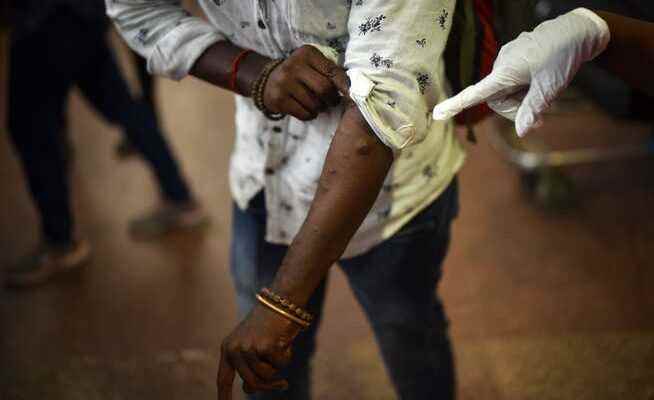The number of cases of this viral disease continues to rise – globally and also in Switzerland. This increases the risk for experts that the pathogen imported from Africa could also become native to us.
The signs of monkeypox are not always as obvious as they are with this man in India.
At the beginning of June, the World Health Organization (WHO) was still optimistic. The authorities said the chances are good that the monkeypox outbreaks outside of Africa could be stopped. A month and a half later, the situation is still not under control. On the contrary: the number of cases continues to rise. Therefore, at a meeting on Thursday, the WHO discussed for the second time whether monkeypox should be declared a global health emergency. Finally, on Saturday, she announced her decision to declare an international emergency.
Since the first reports from Great Britain in early May, the number of cases has been increasing worldwide. From a handful of cases there are currently over 15,000 reported infections (as of July 19). Most cases are in Spain (over 3100), the US (over 2300), the UK and Germany (both over 2100). The virus has already been detected in 71 countries. Many experts are therefore talking about a pandemic.
Is there a plateau in the growth in new cases?
In Switzerland, too, the number of cases is constantly increasing. The total is currently 216 infections. The disease has recently become notifiable. While the increase in Switzerland was initially exponential, since mid-July the numbers have only increased linearly. The worldwide increase in monkeypox cases also gives the impression that there has been a plateau since mid-July. So that the growth in new infections is relatively stable.
“This plateau is irrelevant to me,” says Zurich travel doctor and epidemic expert Robert Steffen. Because the number of cases depended very much on major events such as the Christopher Street Day Parade in Berlin on July 23 or the Street Parade in Zurich on August 13. Such mega events can lead to super spreading events. Therefore, the curve of the number of cases does not rise regularly, but as a zigzag line.
Steffen had already expected in June that the WHO would declare a global health emergency in the case of monkeypox. “This is an important signal to increase awareness of the topic,” says the doctor. It also helps with international cooperation to combat the outbreaks.
On the other hand, with a disease like monkeypox, there is a risk that the declaration of a state of emergency in certain countries will have negative consequences, Steffen admits. Because the infection currently affects mainly homosexual and bisexual men (MSM). The public health emergency could increase the stigmatization of this population group, making disease control more difficult.
“In Switzerland, the declaration of a health emergency would have hardly any impact on the medical front,” says infectiologist Huldrych Günthard from the University Hospital Zurich (USZ). About ten patients with monkeypox have been treated at his clinic in recent weeks. Some of them had high fever and severely swollen lymph nodes. In addition, the typical skin blisters could be very painful and disfiguring. He has not yet had to hospitalize a patient. This shows that serious illnesses rarely occur. In the current outbreak in Europe, no patient has died.
So far, women have hardly been infected
According to Günthard, only one woman was among the patients in Switzerland diagnosed with monkeypox. The other patients were younger men, most of whom belong to the MSM group, says the doctor. This image of the typical patient also applies to the worldwide cases of monkeypox, says Steffen: “People in a stable relationship need not fear monkeypox. They are hardly at risk as long as there are no cases of illness in their household and they are not exposed at work.” So far there are very few people who have been infected through heterosexual or non-sexual contacts.

Information about monkeypox at a store in New York.
In order to be infected, close physical contact is required, such as occurs during sex. However, it is also possible to become infected in the hustle and bustle of a major event via infected droplets from the respiratory tract or via shared objects. “The bedding can certainly be contagious,” says Steffen, “because it can contain many viruses from damaged skin blisters.” Other objects such as a ballpoint pen, on the other hand, do not pose any relevant danger, emphasizes the emeritus professor of medicine.
According to Günthard, there are still many unanswered questions about monkeypox. The pathogen can also be detected in the blood, saliva and semen of infected people. However, it is still unclear how relevant these findings are for transmission. Likewise the fact that there are also people infected with this disease who develop no or only very mild symptoms. In others, the skin lesions – such as in the case of transmission via oral sex – are limited to the oral mucosa and lips. All of this complicates the fight against the spread of the disease.
Like many other experts, Steffen and Günthard assume that we will not get rid of monkeypox in Europe any time soon – if we can get rid of it at all. This is mainly due to the fact that contact tracing works poorly with this disease. Because many men who tested positive do not want to or cannot give their – sometimes anonymous – contact persons. This means that the number of unreported cases should be very high.
But there is also good news: Anyone who has gone through the disease should be immune to the virus afterwards. That could stop the outbreaks naturally. Optimistic voices therefore still believe that the chain of infection can be stopped, especially since the virus has so far spread in a relatively small population group.
Steffen sees things differently: “There are always new young men entering the MSM community,” he points out. Therefore, the infection process should continue to moth like a fire that is not extinguished. There is also concern that the virus could also be introduced into the heterosexual population via bisexual men. According to experts, it is also conceivable that the virus could be transmitted to animals, which then serve as reservoirs for the disease.
Because of this danger, the Federal Office of Public Health advises all patients with monkeypox to stay away from cats, rodents and other domestic and wild animals. “Should such a reverse zoonosis happen, we have the situation that prevails in many African countries,” says Steffen. There the virus circulates mainly in rodents. From this reservoir, it repeatedly reaches people, who can then pass it on to contact persons.
When does Switzerland offer the vaccination?
That’s why vaccination is so important. This is already being used in countries such as Great Britain, Germany and the USA. Health workers and contacts of people who have been proven to be infected are given priority. Because of the difficulties with contact tracing, all people in Great Britain who are at increased risk can now be immunized against the disease – regardless of whether they have had contact with an infected person.
“We should also make such a vaccination offer in Switzerland,” says Günthard. “People whose sexual behavior is such that they also have an increased risk of sexually transmitted diseases are currently most affected by infection.” Some of these people are HIV-positive, but by no means all, emphasizes the doctor. If the vaccination could be brought to the relatively small but very active and well-connected MSM community, then the majority of the population at risk would have been reached, says Günthard. “We don’t have to vaccinate the entire population.”
It is not known when the vaccination against monkeypox will be introduced in Switzerland. The BAG responsible for this has not yet made a public statement. However, before a vaccination recommendation can be made, the required vaccine from the Danish company Bavarian Nordic must be approved and available in Switzerland. When this is likely to be the case, it is not yet clear, writes the BAG in response to a corresponding request.
